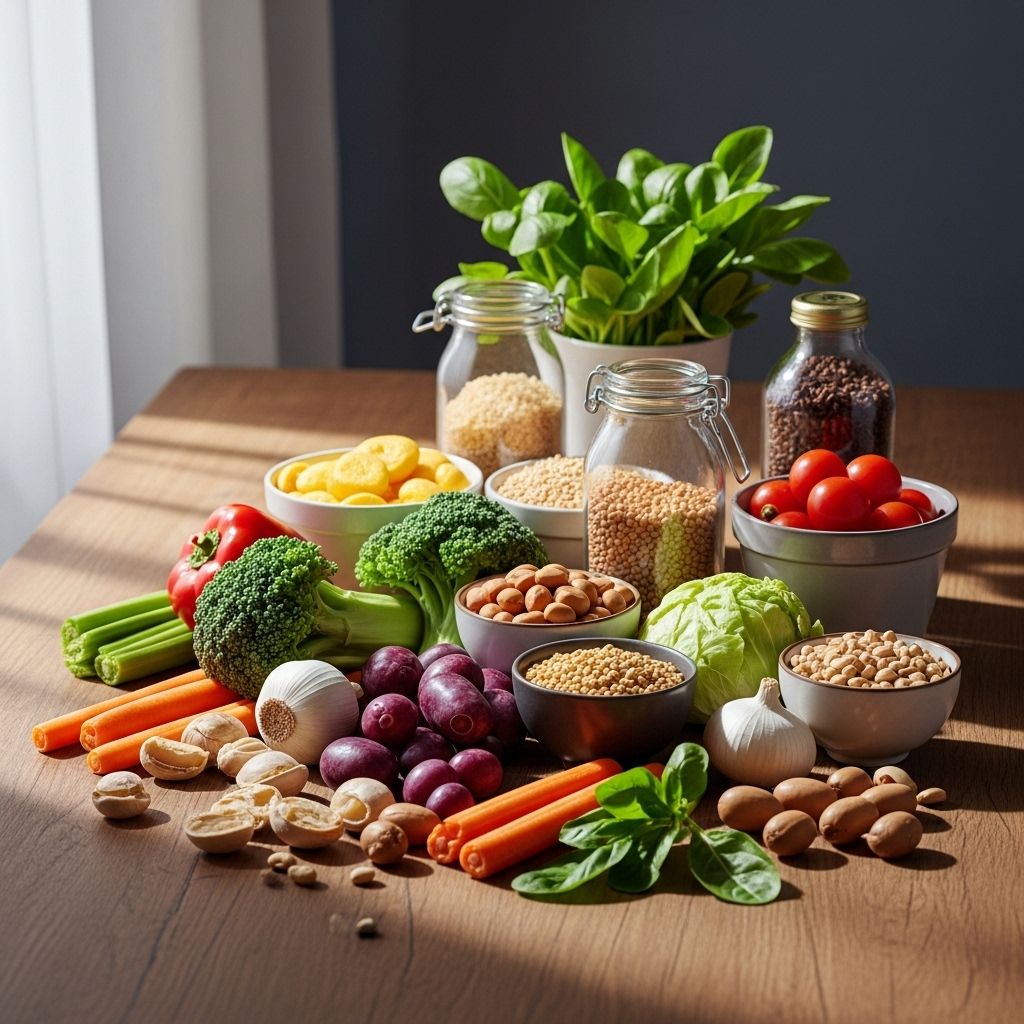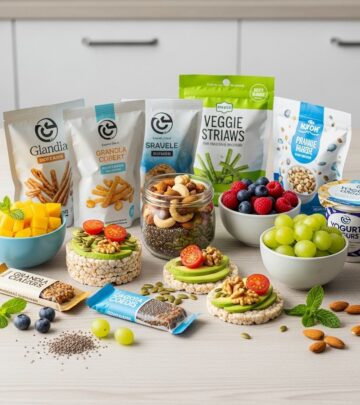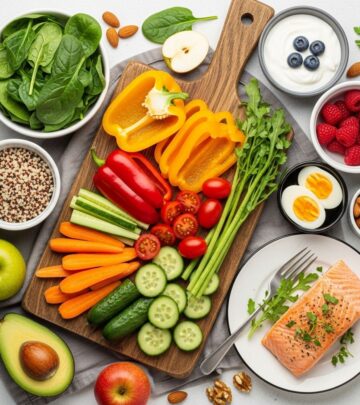15 High-Protein Foods That Benefit Gut Health and Microbiome
Strengthen your digestive ecosystem with protein-rich choices that support friendly bacteria.

Your gut isn’t just responsible for digesting food — it’s a bustling environment home to trillions of microorganisms, collectively known as the gut microbiome. This complex ecosystem plays an essential role in nutrient absorption, immune function, inflammation, and overall health. While protein is often highlighted for building and maintaining muscle, the type, source, and quality of protein you consume can also impact your digestive health and microbiome balance.
Why Gut Health Matters
Your gut microbiome influences everything from your metabolism to your mood. Maintaining a diverse and balanced community of gut bacteria is linked to:
- Improved nutrient absorption
- Stronger immunity
- Reduced inflammation
- Lower risk of chronic diseases
- Better mental health and cognitive function
Diets rich in fiber, plant-based foods, and select proteins are associated with healthier, more diverse microbiomes. The protein you choose can encourage the growth of beneficial bacteria, support regular digestion, and even aid in weight management.
The Relationship Between Protein and the Gut Microbiome
Recent research confirms that the source and amount of protein in your diet significantly affect the balance and function of your gut microbiota. Here’s how:
- Different protein sources (animal vs. plant) create unique bacterial profiles in the gut, changing which types of microbes thrive.
- Digestibility and amino acid content influence which proteins reach the colon, where gut bacteria can use them for energy and growth.
- Undigested proteins can be fermented by gut bacteria, leading to the production of beneficial short-chain fatty acids (SCFAs) or potentially harmful metabolites like ammonia or sulfides, depending on the protein source and microbial community.
- Plant-based proteins generally promote more beneficial bacterial strains and produce fewer toxins, while excess animal proteins may promote the growth of less favorable bacteria if not balanced with fiber.
How to Choose Proteins for a Healthy Gut
To maximize gut health, nutrition experts recommend focusing on a mix of high-quality protein sources — especially those rich in prebiotic fibers (which feed good bacteria) and those shown to favorably influence microbiome diversity:
- Opt for lean animal proteins such as fish, poultry, and eggs, but prioritize plant-based options for added fiber and phytonutrients.
- Include fermented or probiotic-rich foods like yogurt, kefir, or tempeh, which contribute live beneficial bacteria.
- Choose minimally processed plant proteins such as beans, lentils, nuts, and seeds, which assist in maintaining good gut bacteria balance and regularity.
- Balance with a fiber-rich diet — pair proteins with vegetables, whole grains, and fruits to avoid negative gut impacts from excess protein.
- Rotate your protein sources to cultivate diverse microbes, which is key for gut resilience and overall health.
15 High-Protein Foods That Promote a Healthy Gut
Below are the top high-protein foods that offer notable benefits for gut health, digestion, and microbiome diversity. Each provides substantial protein along with bonus gut-friendly nutrients.
Greek Yogurt
Protein per cup: 15–20 grams
Why it’s good for your gut: Greek yogurt is rich in protein and live probiotic cultures (like Lactobacillus and Bifidobacteria) that help balance the gut microbiome and improve digestion. Choose plain, unsweetened varieties for best results.
Tempeh
Protein per ½ cup: 15–18 grams
Why it’s good for your gut: This fermented soybean product is packed with plant protein, contains prebiotic fibers that feed healthy bacteria, and offers naturally occurring probiotics from fermentation. Tempeh is also rich in vitamins and minerals.
Lentils
Protein per cup (cooked): 18 grams
Why it’s good for your gut: Lentils are a prebiotic powerhouse — high in both protein and fermentable fibers. These help feed beneficial gut bacteria and support regularity.
Chickpeas
Protein per cup (cooked): 14–15 grams
Why it’s good for your gut: Chickpeas (garbanzo beans) are loaded with protein and soluble fiber, which help promote the growth of healthy gut bacteria and improve stool consistency.
Kefir
Protein per cup: 8–10 grams
Why it’s good for your gut: Kefir is a fermented dairy drink teeming with live probiotics and is more digestible than milk for many people. Its unique combination of protein and active bacteria help soothe the gut and foster a balanced microbiome.
Salmon
Protein per 3 oz (cooked): 20–22 grams
Why it’s good for your gut: Salmon delivers high-quality protein and anti-inflammatory omega-3 fatty acids, which may help reduce gut inflammation and support beneficial bacteria.
Eggs
Protein per large egg: 6 grams
Why it’s good for your gut: Easy to digest, eggs supply all essential amino acids and have a neutral effect on gut bacteria. Egg yolks include compounds like choline that may have additional gut-health benefits.
Quinoa
Protein per cup (cooked): 8 grams
Why it’s good for your gut: This gluten-free, plant-based complete protein is high in fiber, supports gut motility, and contains prebiotics that help grow healthy bacteria.
Tofu
Protein per ½ cup: 10 grams
Why it’s good for your gut: Tofu, made from soybeans, offers easily digestible protein and may help foster favorable bacterial populations. It is also low in saturated fat.
Chicken Breast
Protein per 3 oz (cooked): 25–27 grams
Why it’s good for your gut: Lean, skinless chicken breast is a high-quality protein with minimal saturated fat, and in moderation, it supports the needs of those who do not wish to follow a plant-based diet.
Sardines
Protein per 3 oz: 21 grams
Why it’s good for your gut: These small, oily fish are protein-rich and high in anti-inflammatory omega-3s and vitamin D, supporting gut and immune health.
Cottage Cheese
Protein per ½ cup: 12–14 grams
Why it’s good for your gut: Look for live and active cultures on the label — these supply probiotics that benefit gut flora, along with the robust protein content.
Pumpkin Seeds
Protein per ounce: 7 grams
Why it’s good for your gut: These seeds are rich in both protein and fiber, as well as magnesium and zinc, which support the gut lining and immune function.
Black Beans
Protein per cup (cooked): 15 grams
Why it’s good for your gut: Black beans provide a duo of plant protein and fermentable fiber to nourish beneficial bacteria and promote regular bowel movements.
Pistachios
Protein per ounce: 6 grams
Why it’s good for your gut: Studies show pistachios may boost certain beneficial gut bacteria more than other nuts, due to their unique fiber and antioxidant profile.
Plant vs. Animal Protein: Which is Better for Your Gut?
The debate over plant-based versus animal-based proteins is especially relevant when it comes to gut health. Here’s how they compare:
| Plant Proteins | Animal Proteins |
|---|---|
| High in fiber and phytonutrients | Complete proteins (contain all essential amino acids) |
| Promote growth of beneficial gut bacteria (e.g., Lactobacillus, Bifidobacteria) | Low fiber — less direct support for beneficial microbes |
| Fermentation in the colon creates healthy SCFAs | Excess animal protein can produce more potentially harmful metabolites if fiber is lacking |
| May lower risk of inflammation and chronic disease | Best if consumed lean and in moderation |
| Examples: lentils, beans, soy, nuts, seeds, quinoa | Examples: fish, poultry, eggs, Greek yogurt |
How Much Protein Supports Gut Health?
Most healthy adults need about 0.8 to 1.0 grams of protein per kilogram of body weight per day (about 55–75 grams for the average woman or man), but those with higher activity levels or older adults may require more. A focus on moderation and balance is key to supporting a healthy gut:
- Don’t overdo protein: Excess protein, especially animal-based, may disrupt gut bacteria and increase the production of harmful metabolites.
- Space protein meals throughout the day to maximize absorption and prevent digestive overload.
- Always include vegetables or whole grains with high-protein foods for additional gut-friendly fiber and nutrients.
Tips for Maximizing Protein’s Gut Health Benefits
- Prioritize plant-based proteins most of the time — lentils, chickpeas, soy, nuts, seeds, and whole grains provide both protein and fiber, fueling good bacteria.
- Add fermented foods like yogurt, kefir, tempeh, miso, and kimchi to boost probiotic intake.
- Limit excessive red and processed meats, as these have been linked with less favorable gut bacteria changes and greater inflammation when consumed in excess without fiber.
- Mix up your protein sources to support a resilient, diverse microbial community.
- Pair protein with prebiotic-rich foods (such as garlic, onions, asparagus, and apples) for additional benefits.
Potential Pitfalls: Can Too Much Protein Harm Gut Health?
While adequate protein is crucial, consuming too much — especially without adequate fiber — can negatively affect the gut:
- Excess undigested proteins may produce harmful byproducts, including ammonia and sulfides, which are linked with gut inflammation, discomfort, and an imbalance in beneficial bacteria.
- High-protein, low-fiber diets may reduce gut microbiome diversity and increase the risk of digestive issues such as constipation or bloating.
- Animal protein excess can result in lower populations of favorable bacteria unless balanced with plenty of plant fiber.
The best strategy? Balance protein with fruits, vegetables, whole grains, and legumes for optimal digestive—and overall—wellness.
Frequently Asked Questions (FAQs)
What is the best source of protein for gut health?
Research consistently favors plant-based proteins—such as lentils, beans, chickpeas, and soy—as the most beneficial for gut health, due to their fiber and prebiotic content. Include dairy or fermented foods and fish for a diverse, balanced diet.
Can I get enough protein from a plant-based diet to support my gut?
Absolutely. Combining a variety of lentils, beans, soy foods (tofu, tempeh), nuts, seeds, and whole grains ensures you receive all essential amino acids and ample gut-friendly fiber.
Does eating more protein aid in digestion?
Higher protein intake may help with muscle maintenance and satiety, but gut health is most improved when protein is eaten in moderation, sourced from whole foods, and paired with fiber for balanced digestion.
Should I avoid animal protein for gut health?
No need to avoid animal proteins entirely—just moderate intake and choose lean options like poultry, fish, eggs, and yogurt. Combine with plant-based meals for best microbiome outcomes.
Can probiotics help if I have digestive issues from protein?
Yes, probiotic-rich foods like yogurt, kefir, and tempeh can restore gut flora balance and help ease certain digestive symptoms. Consult a healthcare provider if problems persist.
How can I tell if my gut is healthy?
Signs of healthy gut function include regular, pain-free bowel movements; minimal bloating; good energy levels; and absence of chronic gastrointestinal issues. Dietary changes, including protein choices, can help maintain these benefits.
Expert Tips for Building a Gut-Healthy, High-Protein Diet
- Eat a wide variety of plant foods—including beans, lentils, nuts, seeds, and vegetables—daily.
- Include one to two servings of probiotic-rich foods like yogurt, kefir, or tempeh each day.
- For animal proteins, choose lean cuts and cook with healthy fats (like olive oil), and always pair with high-fiber vegetables.
- Stay hydrated—water helps move fiber and protein through the digestive system and supports gut function.
Takeaway: Healthy Protein Choices for a Thriving Gut
Protein is essential, not just for muscle and metabolism, but also for the health of your digestive system and the trillions of microbes that live there. By prioritizing a variety of plant-based proteins, fermented foods, fiber-rich meals, and a balance between animal and plant sources, you can support a diverse, flourishing gut microbiome — and overall vitality.
For personalized nutrition recommendations, consult a registered dietitian or healthcare provider.
References
- https://asm.org/press-releases/2024/june/high-protein-diet-impact-gut-microbes-body-comp
- https://www.medicalnewstoday.com/articles/switching-protein-rich-diet-may-change-gut-bacteria-aid-weight-loss
- https://news.ncsu.edu/2025/04/protein-sources-change-the-gut-microbiome/
- https://pmc.ncbi.nlm.nih.gov/articles/PMC8840478/
- https://www.health.harvard.edu/nutrition/high-protein-foods-the-best-protein-sources-to-include-in-a-healthy-diet
- https://lifewaykefir.com/10-high-protein-recipes-to-nourish-your-gut/
- https://www.prevention.com/food-nutrition/healthy-eating/a67992652/foods-for-gut-health/
Read full bio of Sneha Tete












